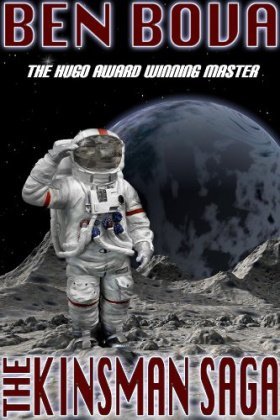In the meantime, of course, the scientists and engineers were making steady progress in the fields of space technology, lasers, and computers. So much so that in March 1983 President Reagan announced the start of the Strategic De- fense Initiative. Once again I watched my fiction start to turn into history. Nothing in the original Millennium and Kinsman has been invalidated by the events of the past few years. But now many of the details that I had to sketch minimally can be shown in much clearer perspective.
Now, in this single volume, the whole story is played out from beginning to end. From a brand-new lieutenant on a joyride in a supersonic Jet fighter plane to a man who literally carries the weight of two worlds on his shoulders. From a brash youngster who thinks of sex as nothing more than fun to a man who cares so much about the woman he loves that he is afraid of a relationship that will hurt her.
There are many differences between the original pair of novels and this new retelling of the Kinsman saga. For one thing, the human, emotional story of Kinsman and the woman he has loved all his life is told properly for the first time. Because the two novels were originally written the way they were, many details—and some larger aspects—of the story did not blend smoothly, one book to the other. Now they have been reexamined, rethought, and rewritten. All the characters and themes now mesh properly, and you can read the story of Kinsman's life from beginning to end as a single seamless garment.
The social and political implications of building a defense against nuclear attack, however, remain almost exactly as I originally wrote them. That is because they have not changed. The ultimate result of space-based defenses against nuclear attack will be a unified world government. There is absolutely no doubt in my mind about that. Who runs that government, what kind of a government it will be, what role the United States will play in it and what role other nations will play—all those questions are unanswered. Their answers will be the political history of the twenty-first century.
There are many symbols in Kinsman's story. I mention this mainly because most critics have been blind to them. Or perhaps they think of symbolism only in its psychological sense, where rockets are considered phallic and a wheel- shaped space station is thought to be vaginal. That is not the sort of symbolism I am speaking of.
Kinsman himself is a symbol. A young American male, full of the adventure of flying, who brings both love and death to the pristine realm of outer space. In Millennium, he becomes a Christ figure, and his closest friend, Frank Colt, takes on the role of Judas. Colt himself symbolizes the dilemma of the black man in modern America.
The Christian symbolism is at its plainest in the section of Kinsman where he rescues the injured astronaut on the surface of the Moon. In that tale, titled "Fifteen Miles" when it appeared in a science fiction magazine in its original form, the surface of the Moon becomes a testing ground, a place of ordeal and punishment. The central question is redemption:
Can Kinsman save his sou!, or is he damned forever? This becomes the question for all the rest of his life, and forms his underlying motivation in Millennium.
The technological gadgets of the story also serve as symbols. Equating Moonbase's water factory with a human being's heart and blood is obvious enough. So, perhaps, is the symbolism of a lance of light that destroys the death machines of ballistic missiles. But the idea of humankind's reach into space forcing a change in human attitudes on Earth, which pervades the story of Kinsman's life, has escaped the atten- tion of most critics.
There are two aspects to this, in the story. One is the laser-armed satellites, the Star Wars system, placed in orbit to defend against nuclear missile attack. The other is weather control, using technology to tame one of the most fundamen- tal forces on Earth. Push and pull. Negative and positive. Yin and yang. The important point is that once the human race began to extend its ecological niche beyond the limits of planet Earth, all our old ways of thinking became doomed. Most people do not realize this yet. Most are oblivious to the fact that national borders are swiftly losing their meaning in a world of communications satellites, hydrogen bombs, conti- nent-spanning missiles, and the expansion of human life into space.
The facts are there to see, but most people are not emotionally prepared to deal with them. It is through the symbolism of fiction that we prepare our minds for these new concepts. In the truest sense, Chet Kinsman does exist, and his message of hope and peace and love is the ultimate reality.
—Ben Bova West Hartford. March 1987 Connecticut
BOOK
KINSMAN
Fear death?—to feel the fog in my throat,
The mist in my face, When the snows begin, and the blasts denote
I am nearing the place, The power of the night, the press of the storm,
The post of the foe, Where he stands, the Arch Fear in a visible form. Yet the strong man must go ...
—Robert Browning
Age 21

























